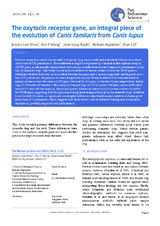The oxytocin receptor gene, an integral piece of the evolution of Canis familaris from Canis lupus
Autor
Lee Oliva, Jessica
Wong, Yen T.
Rault, Jean-Loup
Appleton, Belinda
Lill, Alan
Editor
Universidad de Córdoba, Departamento de Medicina y Cirugía AnimalFecha
2016Materia
DogGene
Object
Oxytocin
Wolf
METS:
Mostrar el registro METSPREMIS:
Mostrar el registro PREMISMetadatos
Mostrar el registro completo del ítemResumen
Previous research in canids has revealed both group (dog versus wolf) and individual differences in object choice task (OCT) performance. These differences might be explained by variation in the oxytocin receptor (OXTR) gene, as intranasally administered oxytocin has recently been shown to improve performance on this task by domestic dogs. This study looked at microsatellites at various distances from the OXTR gene to determine whether there was an association between this gene and: i) species (dog/wolf) and ii) good versus bad OCT performers. Ten primer sets were designed to amplify 10 microsatellites that were identified at various distances from the canine OXTR gene. We used 94 (52 males, 42 females) blood samples from shelter dogs, 75 (33 males, 42 females) saliva samples from pet dogs and 12 (6 males, 6 females) captive wolf saliva samples to carry out our analyses. Significant species differences were found in the two markers closest to the OXTR gene, suggesting that this gene may have played an important part in the domestic dogs’ evolution from the wolf. However, no significant, meaningful differences were found in microsatellites between good versus bad OCT performers, which suggests that other factors, such as different training and socialisation experiences, probably impacted task performance.

